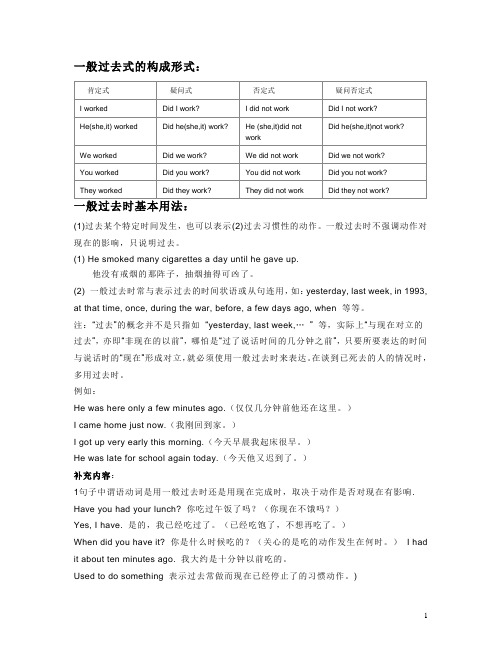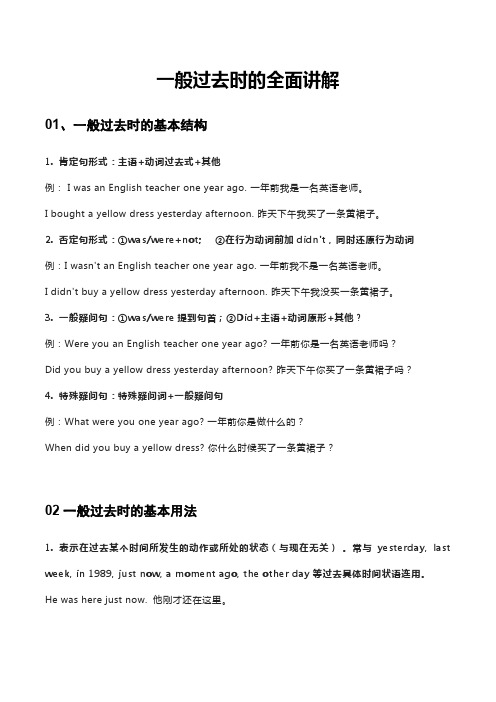(完整word版)一般过去式疑问句否定句讲解与练习
- 格式:pdf
- 大小:11.70 KB
- 文档页数:2

一般过去时一、一般过去时的简介:定义:表示过去某时发生的动作或存在的状态.结构:“主语+动词的过去式”用法:1。
表示过去某个时间发生的动作或存在的状态。
He was here yesterday.I got up at seven yesterday morning.My mother was at work yesterday afternoon.Did you have a good time last summer?2。
表示过去经常或反复发生的动作。
My mother often went to work by taxi last year.When I was a student, I often listened to music.3。
常与一般过去时态连用的时间有:at that time, then, at that moment, yesterday, yesterday morning (afternoon, evening…)last night (week, month, year…),一段时间+ago(several days ago), two days ago, a week ago, three years ago…in 1990,(in 1997…) ,just now, long before, long long ago二. 动词过去式构成规则1、一般在动词原形末尾加– edhelp → helped, look → looked, play → played, work → worked, listen → listened, wash →washed, clean → cleaned,2、结尾是 e 的动词加 -- dlive--—lived hope———hoped use-—-used like ——- liked3、末尾只有一个辅音字母的重读闭音节,先双写这个辅音字母,再加-ed。

一般过去式的构成形式:(1)过去某个特定时间发生,也可以表示(2)过去习惯性的动作。
一般过去时不强调动作对现在的影响,只说明过去。
(1) He smoked many cigarettes a day until he gave up.他没有戒烟的那阵子,抽烟抽得可凶了。
(2) 一般过去时常与表示过去的时间状语或从句连用,如:yesterday, last week, in 1993, at that time, once, during the war, before, a few days ago, when 等等。
注:“过去”的概念并不是只指如“yesterday, last week,…”等,实际上“与现在对立的过去”,亦即“非现在的以前”,哪怕是“过了说话时间的几分钟之前”,只要所要表达的时间与说话时的“现在”形成对立,就必须使用一般过去时来表达。
在谈到已死去的人的情况时,多用过去时。
例如:He was here only a few minutes ago.(仅仅几分钟前他还在这里。
)I came home just now.(我刚回到家。
)I got up very early this morning.(今天早晨我起床很早。
)He was late for school again today.(今天他又迟到了。
)补充内容:1句子中谓语动词是用一般过去时还是用现在完成时,取决于动作是否对现在有影响. Have you had your lunch? 你吃过午饭了吗?(你现在不饿吗?)Yes, I have. 是的,我已经吃过了。
(已经吃饱了,不想再吃了。
)When did you have it? 你是什么时候吃的?(关心的是吃的动作发生在何时。
)I had it about ten minutes ago. 我大约是十分钟以前吃的。
Used to do something 表示过去常做而现在已经停止了的习惯动作。

一般过去式(一)一般过去时的概念一般过去时用来表示过去某一时间内发生的动作或存在的状态以及过去习惯性、反复性的动作。
谓语动词要用动词的过去式,常和表示过去的时间状语连用,如yesterday昨天、last night昨晚、last week上周、last year去年,等。
(二)一般过去时的结构(可分三类不同的结构)1.Be动词的一般过去时am is 的过去式为was; are的过去式为were肯定句式:主语+ was /were+ 其它.否定句式:主语+ was/were + not + 其它.一般疑问句:was/were+ 主语+ 其它?2.实义动词的一般过去时态肯定句要使用动词的过去式,否定句和疑问句要使用助动词do 和does 的过去式did.肯定句式:主语+ 动词(过去式)+ 其它否定句式:主语+ didn’t(did not)+ 动词(原形)+ 其它一般疑问句:Did + 主语+ 动词(原形)+ 其它【do , does的过去时均为did】?注:(1)did和didn’t是构成一般过去时的助动词,其特点是要在其后跟动词的原形。
(2)实意动词do的一般过去时I do my homework every day.(用yesterday改写句子)I did my homework yesterday.I didn’t do my homework yesterday.(否定句)Did you doyour homework yesterday?Yes ,I did. /No, I didn’t.(一般疑问句)3. 情态动词的一般过去时态肯定句式:主语+ 情态动词+ 其它否定句式:主语+ 情态动词+ not + 其它.一般疑问句:情态动词+ 主语+ 其它?注:情态动词的过去式:can→could , may→might , must→must ,will-would,should-should。

一般过去时的全面讲解01、一般过去时的基本结构1. 肯定句形式:主语+动词过去式+其他例: I was an English teacher one year ago. 一年前我是一名英语老师。
I bought a yellow dress yesterday afternoon. 昨天下午我买了一条黄裙子。
2. 否定句形式:①was/were+not; ②在行为动词前加didn't,同时还原行为动词例:I wasn't an English teacher one year ago. 一年前我不是一名英语老师。
I didn't buy a yellow dress yesterday afternoon. 昨天下午我没买一条黄裙子。
3. 一般疑问句:①was/were提到句首;②Did+主语+动词原形+其他?例:Were you an English teacher one year ago? 一年前你是一名英语老师吗?Did you buy a yellow dress yesterday afternoon? 昨天下午你买了一条黄裙子吗?4. 特殊疑问句:特殊疑问词+一般疑问句例:What were you one year ago? 一年前你是做什么的?When did you buy a yellow dress? 你什么时候买了一条黄裙子?02一般过去时的基本用法1. 表示在过去某个时间所发生的动作或所处的状态(与现在无关)。
常与yesterday, last week, in 1989, just now, a moment ago, the other day等过去具体时间状语连用。
He was here just now. 他刚才还在这里。
What did you do yesterday? 你昨天做了什么事?2. 在过去一段时间内的经常性或习惯性动作。

一般过去时1.一般过去时的概念、结构以及用法(1)一般过去时用来表示过去某一时间内发生的动作或存在的状态以及过去习惯性、yesterday反复性的动作。
谓语动词要用动词的过去式,常和表示过去的时间状语连用,如 last year去年,等。
昨天、last night昨晚、last week上周、动词的过去式来表◆一般过去时主要表示过去的动作或状态。
在句子中由主语+ 达。
) (一般现在时1.He walks to school.)(一般过去时 2.He walked to school.必因此原因的walk, 由于主语是第三人称单数he,例1.中的动词walks时现在式表示目前习惯性、经常性动作。
可译为“他现在经常步行上,“须加上 s”学”。
是过去式,过去式是叙述过去事情的动词形式,所以这句话时walked例2.中的动词“他曾经这句可译为表示的是过去的某时,例如昨天、上周或学生时代等过去的某一时间,步行上学”。
)一般过去时的几种结构(2动词的过去式1.bewas 的过去式是am与iswere的过去式是are 动词的过去时的句型如下:be(was were)~ 动词的过去式肯定句:主语+be ?+ not ~ was, were)主语+ be动词的过去式(否定句:??+ 主语~ be疑问句:动词的过去式(was, were)?他昨天很忙。
) ○He was busy yesterday. (肯定句○He was not busy yesterday. (否定句) 他昨天不忙。
) 疑问句他昨天忙吗?○Was he busy yesterday? ( )be动词过去时的肯定句1(麦克去年在美国。
Mike was in the United States last year.7/ 1ar, There is (are ) 的句型用于一般过去时需把is be 动词的现在式和过去式:变为它们的过去式:There was (were) …e)be动词过去式的否定句(2 他去年不在加拿大。

一般过去时的否定句和疑问句一般过去时的否定句(Negative Sentences in Simple Past Tense)一般过去时的否定句用于描述过去发生的事情中的否定情况。
构成一般过去时的否定句需要在动词前加上助动词 "did not" 或"didn't",并将动词本身保持原形。
以下是构成一般过去时的否定句的示例:1. 主语 + did not/didn't + 动词原形 + 其他成分- 例如:She did not/didn't go to the party last night.2. 主语 + did not/didn't + 动词原形 + 否定词 + 其他成分- 例如:I didn't see anyone in the park yesterday.需要注意的是,当动词本身为be动词时,不需要再使用助动词 "did"。
直接在be动词前加上 "not" 即可构成否定句。
例如:一般过去时的疑问句(Interrogative Sentences in Simple Past Tense)一般过去时的疑问句用于询问过去发生的事情。
构成一般过去时的疑问句需要将助动词 "did" 放在主语之前,并将动词本身保持原形。
以下是构成一般过去时的疑问句的示例:1. Did + 主语 + 动词原形 + 其他成分?- 例如:Did you study for the test yesterday?2. Did + 主语 + 动词原形 + 否定词 + 其他成分?- 例如:Did she not/didn't watch the movie last night?当动词本身为be动词时,同样需要将助动词 "did" 放在主语之前,形成疑问句。
小学英语一般过去时练习题一、请选择正确的词,把下列句子补充完整。
1.I asked(ask / asked / is asking)him a question yesterday.2.Tom read (read / is reading / reads)English now.3.Did you watered (water / watered / waters)flowers last week?4.Let’s get (get / got / getting)on the No. 1 bus.5.We often watch (watch / watches / watched)TV at home.6.Judy didn’t go (went / go / going)to school yesterday.7.His dad works (works / worked / is working)hard every day.8.There were (were / are / was)some trees near houses two years ago.9.My cousin studies (studies / studied / study)in a middle school in Guangzhou.10.Mr. White came (came / comes / is coming)China last year.11.She is going to have (have / had / has) a big party this Sunday.12.Where did you meet (meet / met / meeting)Miss White.13.They wanted to go (go / went / going)to Beijing last week.14.Look, Tom is watching (watches / watched / is watching)TV in the living-room。
一、肯定句改否定句的方法——一步法1、在be 动词后加not。
如:is not ,are not ,am not,was not,were not;2、在can,等后加not。
如:cannot3、上述都没有的,在动词前加助动词否定形式do not, does not. (don’t/doesn’t)4、some 改成any。
二、肯定句改一般疑问句的方法——三步法1、把be 动词放在句首,剩下的照抄,(some 改成any,my 改成your 等)句点改成问号。
2、把can,等放到句首,剩下的照抄,(some 改成any,my 改成your 等)句点改成问号。
例如:陈述句: They are in the park. He can play the guitar..一般疑问句: Are they in the park? Can he play the guitar?把下列句子变成一般疑问句1. I am listening to music.2. Mike is a student.3. Sarah can clean the classroom.4. They are in the zoo.5. There are some flowers in the vase.6.This is my sister.7.We are sweeping the floor.3、上述都没有的,在句首请助动词Do/Does 帮忙,剩下的照抄,(some 改成any,my 改成your 等)句点改成问号。
例如:陈述句: I like the ducks. He likes the dogs.一般疑问句: Do you like the ducks? Does he like the dogs?把下列句子改为一般疑问句。
1.We need some masks.2.They like making the puppet.3.Su Hai and Su Yang live in a new house.4.I put a book on my head.5.They sing “In the classroom” together.6.We play basketball on Sundays.7.Tom likes listening to music三、肯定句改特殊疑问句的方法——四步法1、在一般疑问句的基础上,句首添加一个疑问词即可,可根据划线部分确定是什么疑问词。
初中英语语法:八种时态详解与练习一.概念:英语中表示不同时间发生的动作或存在的状态,需用不同的动词形式表示,这种不同的动词形式称为时态。
二.种类:(基本时态)一般现在时一般过去时现在进行时过去进行时一般将来时过去将来时现在完成时过去完成时一般现在时一、概念:经常、反复发生的动作或行为及现在的某种状况。
二、常搭配的时间状语:always, usually, often, sometimes, every week (day, year, month…), once a week,on Sundays, etc.三、基本结构①be动词(is,am,are);②行为动词(主语是第三人称单数时谓语动词要加s或es外) 否定形式:①am/is/are+not;②此时态的谓语动词若为行为动词,则在其前加don't,如主语为第三人称单数,则用doesn't,同时还原行为动词。
一般疑问句:①把be动词放于句首;②用助动词do提问,如主语为第三人称单数,则用does,同时,还原行为动词。
例句:I go to school at 6 every morning. 每天早上我七点去上学。
Summer follows spring. 春天之后是夏天。
I learned that the earth goes around the sun when I was in primary school. 我在小学就学过地球是围绕太阳转的。
Pride goes before a fall. 骄者必败。
四、基本用法:1) 描述当前时间内经常出现、反复发生的动作或存在的状态。
在这种情景中,句子常带有表示频率的时间状语:always , everyday , often , once a week (month , year , etc.) , sometimes , seldom , usually等等,以表示句中的动作或状态是习惯性的、经常性的。
(完整版)英语肯定句、否定句、一般疑问句和特殊疑问句地讲解与练习肯定句、否定句、一般疑问句和特殊疑问句的讲解与练习二.句子的种类类别用法标点例句陈述句肯定叙述一件事情或说明说话人的看法.This is a bag.这是一个包。
That's my book.那是我的书。
否定I can’t see a bag over there.I don't know.我不知道。
疑问句一般用于提出问题?Are you a student?你是学生吗?Do you like puppets?Can you speak English?你会说英语吗?特殊用于提出问题?What's your name?你的名字是什么?Where's my bag?我的包在哪里How many trees are there?那儿有多少树?选择用于提出问题?Is your friend a boy or a girl?你的朋友是男孩还是女孩?反意用于提出问题?It's a fine day, isn't it?祈使句表示命令或请求、建议.或!Put it here!把那个放这儿。
Look at the noticeboard.看公告栏。
感叹句表示惊讶赞美愤怒等强烈情感!How smart!多么聪明啊!Glad to see you!见到你真是高兴!What a nice pencil case!一、be动词:am, is, are二、肯定句、否定句、一般疑问句和特殊疑问句定义1.肯定句:表示肯定的意思, 即不含有否定词“不”。
比如:我是一个学生 I am a student.他去上学 He goes to school.2.否定句:表示否定的意思。
比如:我不是一个男孩。
I am not a boy.他不去上学 He does not go to school.3. 一般疑问句:回答为“是yes”或者“否no”的问句。
课后练习
一般过去式的否定句
1.动词是Be动词时,一般过去时的否定式是在be动词后加not。
句型:主语+wasn’t/weren’t…
I was in Beijing yesterday. We were in Beijing yesterday.
否定句:I wasn’t in Beijing yesterday. We weren’t in Beijing yesterday.
Exercises(练习):
( ) 1. It ____________ (not be) Ben's birthday last Friday.
A. wasn’t
B. weren’t
C. isn’t
D. aren’t
( ) 2. These men_________________ (not be) firemen a week ago.
A. wasn’t
B. weren’t
C. not be
D. aren’t
( ) 3. They _____________ (not be) in Beijing three days ago.
A. wasn’t
B. weren’t
C. not is
D. aren’t
( ) 4. It ____________ (not be) the 2nd of November yesterday.
A. wasn’t
B. weren’t
C. not are
D. aren’t
2.动词是行为动词时,一般过去时的否定式是在动词原形前加助动词did not (didn’t).句型:主语+didn’t+动词原形
I told them the news yesterday.
否定句:I didn’t tell them the news yesterday.
Exercises(练习):
1. Miss Guo ______________ (not get) up late the day before yesterday.
2. We all ______________ (not have) a good time three days ago.
3. She _____________ (not find) a beautiful butterfly just now.
4. I ____________ (not watch) a cartoon yesterday evening.
5. Her father ___________ (not read) a newspaper last night.
行为动词一般过去时的疑问式
一、一般过去式的一般疑问句:
1.有be动词时,把be动词提前
句型:Was+主语+…? / Were+主语+ … ?
There were three cups of tea on the table just now.
一般疑问句:Were there three cups of tea on the table just now?
Yes, there was. No, there wasn’t.
1. There were some oranges in the cup.(变一般疑问句)
_________ there ___________ orange in the cup?
2. It was Monday yesterday. (变一般疑问句)
_________ it Monday yesterday?
3. Mary and Mike were in Shanghai last month. (变一般疑问句)
_________ Mary and Mike in Shanghai last month.
2.动词是行为动词时,在句首加助动词did
Did+主语+动词原形+其他?
They finished their work at four.
一般疑问句:Did they finish their work at four? Yes, they did. No, they didn’t. Exercises(练习):
1。